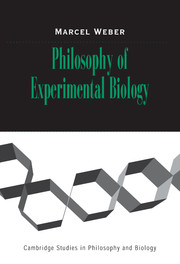Book contents
- Frontmatter
- Contents
- Preface
- Acknowledgements
- 1 Introduction
- 2 Reductionism and the Nature of Explanations
- 3 Discovery: Solving Biological Problems
- 4 Scientific Inference: Testing Hypotheses
- 5 Experimental Systems: A Life of Their Own?
- 6 Model Organisms: Of Flies and Elephants
- 7 Reference and Conceptual Change: Out of Mendel's Garden?
- 8 Developmental Biology and the Genetic Program: Explaining Ontogeny
- 9 Scientific Realism: In Search of the Truth
- Notes
- Bibliography
- Index
7 - Reference and Conceptual Change: Out of Mendel's Garden?
Published online by Cambridge University Press: 08 July 2009
- Frontmatter
- Contents
- Preface
- Acknowledgements
- 1 Introduction
- 2 Reductionism and the Nature of Explanations
- 3 Discovery: Solving Biological Problems
- 4 Scientific Inference: Testing Hypotheses
- 5 Experimental Systems: A Life of Their Own?
- 6 Model Organisms: Of Flies and Elephants
- 7 Reference and Conceptual Change: Out of Mendel's Garden?
- 8 Developmental Biology and the Genetic Program: Explaining Ontogeny
- 9 Scientific Realism: In Search of the Truth
- Notes
- Bibliography
- Index
Summary
Popular accounts have it that genes were discovered in Mendel's monastery garden and that, since then, scientists have built up an increasing body of knowledge about them (for example, Weiner 1999, 19). However, during the twentieth century, the concept of the gene has changed considerably. Genes are today defined as DNA segments that specify the linear sequences of proteins or RNA molecules. But this was not always so. The concept of the gene dates back to a time when both the material carrier and the biochemical function of genes were unknown. Thus, genes could not have been initially defined in the same way. In spite of this, it is assumed by popular accounts that, throughout the twentieth century, the growing body of genetic knowledge – even though it underwent some dramatic transitions – was about the same set of entities, namely the genes that were discovered in Mendel's garden. If this is a caricature of the history of genetics, it is a useful one. For it can serve us as a foil for developing the philosophical problem of reference and conceptual change in genetics.
The starting point of modern philosophical debates on conceptual change lies in the logical empiricist model of scientific progress. According to this model, science advances by older theories being reduced to newer theories, typically ones that treat some set of natural phenomena at a more fundamental level (see also Chapter 2).
- Type
- Chapter
- Information
- Philosophy of Experimental Biology , pp. 188 - 228Publisher: Cambridge University PressPrint publication year: 2004

